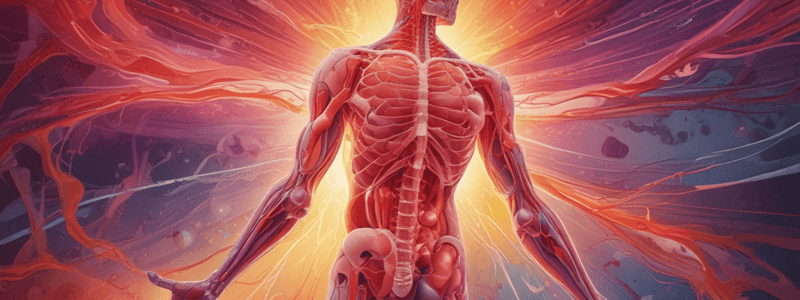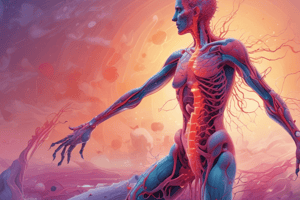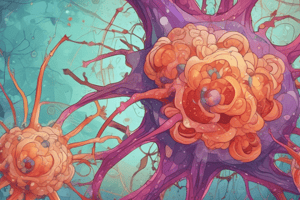Podcast
Questions and Answers
What is the primary purpose of inflammation after an insult or injury, and how does it lead to tissue repair?
What is the primary purpose of inflammation after an insult or injury, and how does it lead to tissue repair?
The primary purpose of inflammation is to eliminate the cause of injury and initiate the repair process. It leads to tissue repair by promoting the removal of debris, recruiting immune cells, and inducing angiogenesis.
How do cellular mediators, such as neutrophils and macrophages, influence the inflammation mechanism, and what are their key functions?
How do cellular mediators, such as neutrophils and macrophages, influence the inflammation mechanism, and what are their key functions?
Cellular mediators, such as neutrophils and macrophages, phagocytose pathogens and remove debris, produce cytokines and chemokines, and present antigens to initiate an immune response.
What is the role of chemical mediators, such as histamine and bradykinin, in the inflammation mechanism, and how do they contribute to the recruitment of immune cells?
What is the role of chemical mediators, such as histamine and bradykinin, in the inflammation mechanism, and how do they contribute to the recruitment of immune cells?
Chemical mediators, such as histamine and bradykinin, increase vascular permeability, cause vasodilation, and attract immune cells to the site of inflammation, thereby amplifying the inflammatory response.
Outline the enzymatic inflammation pathways, including the lipoxygenase and cyclooxygenase pathways, and describe the products and their roles in the inflammatory response.
Outline the enzymatic inflammation pathways, including the lipoxygenase and cyclooxygenase pathways, and describe the products and their roles in the inflammatory response.
How do the products of the lipoxygenase and cyclooxygenase pathways influence the inflammatory response, and what are the implications for chronic inflammation?
How do the products of the lipoxygenase and cyclooxygenase pathways influence the inflammatory response, and what are the implications for chronic inflammation?
Study Notes
Inflammation Mechanism
- Inflammation is a protective response to tissue damage or infection, aimed at eliminating the cause and repairing the damage.
- The purpose of inflammation is to:
- Neutralize the insult or infection
- Remove dead cells and debris
- Restore tissue function
Cellular Mediators
- Cellular mediators are immune cells that participate in the inflammation process.
- Key cellular mediators involved in inflammation:
- Neutrophils: early responders, phagocytose pathogens and debris
- Macrophages: clean up debris, present antigens to immune cells
- Lymphocytes: produce chemical mediators, coordinate immune response
- Dendritic cells: recognize pathogens, present antigens to immune cells
- Cellular mediators influence the inflammation mechanism by:
- Phagocytosing pathogens and debris
- Releasing chemical mediators
- Coordinating immune response
Chemical Mediators
- Chemical mediators are molecules that transmit signals between cells during inflammation.
- Key chemical mediators involved in inflammation:
- Histamine: causes vasodilation, increased permeability
- Bradykinin: causes vasodilation, pain
- Prostaglandins: cause pain, fever, vasodilation
- Leukotrienes: attract immune cells, cause increased permeability
- Cytokines: coordinate immune response, attract immune cells
- Chemical mediators influence the inflammation mechanism by:
- Altering blood flow and permeability
- Attracting immune cells
- Coordinating immune response
Enzymatic Inflammation Pathways
Lipoxygenase Pathway
- Triggered by: calcium influx, phospholipase activation
- Products: leukotrienes, lipoxins
- Role of products:
- Leukotrienes: attract immune cells, cause increased permeability
- Lipoxins: resolve inflammation, promote healing
Cyclooxygenase Pathway
- Triggered by: calcium influx, phospholipase activation
- Products: prostaglandins, thromboxanes
- Role of products:
- Prostaglandins: cause pain, fever, vasodilation
- Thromboxanes: cause vasoconstriction, platelet aggregation
Studying That Suits You
Use AI to generate personalized quizzes and flashcards to suit your learning preferences.
Description
Understand the purpose of inflammation, cellular and chemical mediators' roles, and enzymatic pathways in response to an insult, injury, or infection.




